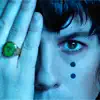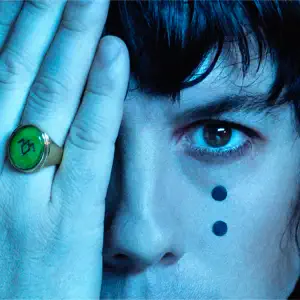


CIUDAD NATAL
Houston, TX
NACIMIENTO
31 de mayo de 1974
Acerca de Johnny Jewel
As a solo artist, producer, composer, member of groups including Chromatics and Glass Candy, and founder of the Italians Do It Better label, Johnny Jewel helped shape the look and sound of music and film in the 2000s and 2010s. Harnessing the nostalgic power of analog synths from the '70s and '80s and coupling it with surreally stylish visuals, echoes of Jewel's evocative aesthetic can be heard in artists such as Chvrches and seen in films like Drive, as well as his own projects. Chromatics' 2012 Kill for Love won widespread praise for its immersive beauty, while Jewel's music for films such as 2016's Home and television projects like the third season of Twin Peaks (2017) established him as a well-regarded composer in his own right.
Born John Padgett, Jewel grew up in Houston, Texas as a creative misfit, listening to the Velvet Underground and Sonic Youth and making controversial art projects while still in high school. After graduation, he moved to Austin, changed his name to John David V, and began making pop as well as electronic noise music, influenced by artists ranging from Karlheinz Stockhausen to the Dead C.
By the mid-'90s, he was living and recording in Portland, Oregon as Johnny Jewel. It was there that he met his future Glass Candy bandmate, Ida No, while working at a grocery store. After forming in 1996, the duo's music evolved from raw, post-glam rock to icy disco on releases like the 1999 single "Brittle Women," 2003's debut album Love Love Love, and 2007's follow-up B/E/A/T/B/O/X. He then joined Chromatics -- a project founded by Adam Miller after seeing Glass Candy perform in 1999 -- in 2005, when the band's revolving lineup settled on Miller, Jewel, Ruth Radelet, and Nat Walker (with whom Jewel formed two more projects, Symmetry and Desire).
In 2006, Jewel founded Italians Do It Better as an electronic-focused imprint of DJ Mike Simonetti's Troubleman Unlimited Records. The label's inaugural release was 2007's After Dark, which featured songs by Jewel's groups as well as like-minded acts such as Farah and Indeep. The collection, along with B/E/A/T/B/O/X and Chromatics' Night Drive, defined Jewel's artistic perspective.
The world of film and television took notice: one of Jewel's earliest fans was Danish director Nicolas Winding Refn, who used Glass Candy's "Digital Versicolor" in his 2008 movie Bronson. Though Refn initially hired Jewel to compose the music for 2011's Drive, Cliff Martinez ended up writing the film's score. However, Desire's "Under Your Spell" and Chromatics' "Tick of the Clock" appeared on the soundtrack, and Symmetry fleshed out Jewel's pieces on 2011's Themes for an Imaginary Film. Following Chromatics' acclaimed 2012 album Kill for Love and 2013's After Dark, Vol. 2 collection, Drive star Ryan Gosling enlisted Jewel to compose the score to his directorial debut, 2014's Lost River. That year, Symmetry's "The Hunt" was used as the theme song to A&E's crime drama Those Who Kill, and Jewel rounded out 2014 by releasing the 31-minute song "The Other Side of Midnight." Two years later, his score for the Belgian film Home won the Georges Delerue Award.
Windswept, which collected songs by Chromatics, Glass Candy, Symmetry, and Desire, as well as solo tracks and songs that appeared in the third season of Twin Peaks, arrived in 2017. He returned in early 2018 with Digital Rain, a flowing suite of songs inspired by his lifelong love of rain and snow. Themes for Television, a collection that included unreleased music he wrote for Twin Peaks, followed that May. ~ Heather Phares
Born John Padgett, Jewel grew up in Houston, Texas as a creative misfit, listening to the Velvet Underground and Sonic Youth and making controversial art projects while still in high school. After graduation, he moved to Austin, changed his name to John David V, and began making pop as well as electronic noise music, influenced by artists ranging from Karlheinz Stockhausen to the Dead C.
By the mid-'90s, he was living and recording in Portland, Oregon as Johnny Jewel. It was there that he met his future Glass Candy bandmate, Ida No, while working at a grocery store. After forming in 1996, the duo's music evolved from raw, post-glam rock to icy disco on releases like the 1999 single "Brittle Women," 2003's debut album Love Love Love, and 2007's follow-up B/E/A/T/B/O/X. He then joined Chromatics -- a project founded by Adam Miller after seeing Glass Candy perform in 1999 -- in 2005, when the band's revolving lineup settled on Miller, Jewel, Ruth Radelet, and Nat Walker (with whom Jewel formed two more projects, Symmetry and Desire).
In 2006, Jewel founded Italians Do It Better as an electronic-focused imprint of DJ Mike Simonetti's Troubleman Unlimited Records. The label's inaugural release was 2007's After Dark, which featured songs by Jewel's groups as well as like-minded acts such as Farah and Indeep. The collection, along with B/E/A/T/B/O/X and Chromatics' Night Drive, defined Jewel's artistic perspective.
The world of film and television took notice: one of Jewel's earliest fans was Danish director Nicolas Winding Refn, who used Glass Candy's "Digital Versicolor" in his 2008 movie Bronson. Though Refn initially hired Jewel to compose the music for 2011's Drive, Cliff Martinez ended up writing the film's score. However, Desire's "Under Your Spell" and Chromatics' "Tick of the Clock" appeared on the soundtrack, and Symmetry fleshed out Jewel's pieces on 2011's Themes for an Imaginary Film. Following Chromatics' acclaimed 2012 album Kill for Love and 2013's After Dark, Vol. 2 collection, Drive star Ryan Gosling enlisted Jewel to compose the score to his directorial debut, 2014's Lost River. That year, Symmetry's "The Hunt" was used as the theme song to A&E's crime drama Those Who Kill, and Jewel rounded out 2014 by releasing the 31-minute song "The Other Side of Midnight." Two years later, his score for the Belgian film Home won the Georges Delerue Award.
Windswept, which collected songs by Chromatics, Glass Candy, Symmetry, and Desire, as well as solo tracks and songs that appeared in the third season of Twin Peaks, arrived in 2017. He returned in early 2018 with Digital Rain, a flowing suite of songs inspired by his lifelong love of rain and snow. Themes for Television, a collection that included unreleased music he wrote for Twin Peaks, followed that May. ~ Heather Phares
Canciones más vistas de
Johnny Jewel en Abril
Top Artistas
Nosotros
Notas
